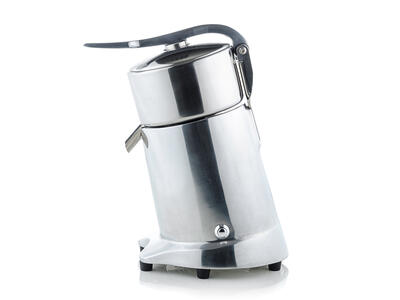These are often used by restaurants offering fresh orange juice, and by bars needing citrus juice as an ingredient. Because they use slow speed or manual extraction, the resulting juice is very sweet and stays fresh for a long time. There are a few types of citrus juicers:
Squeezers – These are hand-held tools that look a bit like two ice cream scoops put together. You put half a citrus into in, then squeeze the handles together. It can be time consuming to make a glass of orange juice, but these are great when you need a small amount of lemon or lime juice.
Manual presses – Big and heavy, these are simple and solid devices where the cut fruit is placed on a funnel and the user pulls down a handle. The leverage creates a very strong force to get the maximum extraction. The can also be used to make pomegranate juice.
Electric citrus juicers – In these juicers, you push the cut citrus onto an auger that spins inside a metal bowl. Some higher-priced models have a handle which presses the fruit against the spinning auger.
Advantages of citrus juicers:
- Generally less expensive than other types
- No peeling required for citrus fruits
- Compact and quiet
Disadvantages of citrus juicers:
- Limited to citrus fruits (and pomegranate with manual presses)
- Slow operation




